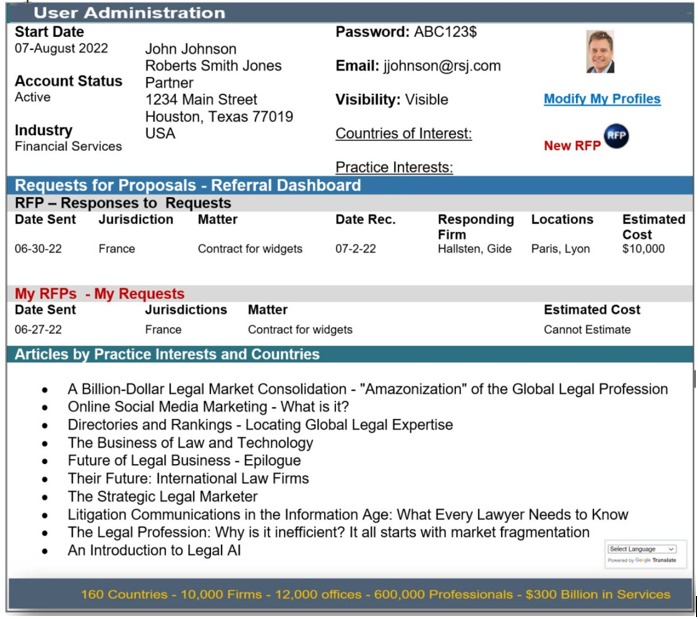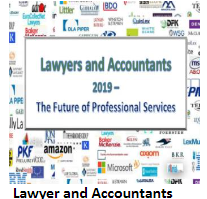Joseph Borstein & Edward Sohn Co-Founder and CEO of LexFusion; SVP, Head of Solutions at Factor
Joseph Borstein Co-Founder and CEO of LexFusion and
was a managing director with EY. He is a former global director of legal
managed services at Thomson
Reuters, formerly Pangea3, and previously served as director of
Litigation Solutions. In this role, Borstein lends his expertise to existing
and prospective clients by providing them with the latest information regarding
the law, ethics, and best practices in the rapidly evolving world of electronic
discovery. Clients will likewise benefit from his extensive experience in data
collection and preservation.
Prior to joining Pangea3, Borstein
practiced law at the New York office of Kasowitz, Benson, Torres & Friedman
LLP, where he litigated complex civil cases in federal, state, and administrative
courts. He has extensive experience in law suits related to securities fraud
and market manipulation; civil racketeering (“RICO”); intra-corporate disputes;
contract disputes; disputes from derivatives and other sophisticated financial
products; as well as S.E.C. enforcement actions. He also has personally managed
and conducted complex document reviews or productions in litigations involving
regulated financial institutions, insurance companies, real estate investment
trusts, hedge funds, private equity consortiums, and pharmaceutical companies.
Borstein received his B.A. in psychology and his J.D. at the University of
Pennsylvania. He is located in Pangea3’s New York City headquarters.
Edward Sohn SVP, Head of Solutions at Factor
and was a managing director with EY.
Previously, he worked at Thomson Reuters. He contributed his extensive
experience in managing all aspects of the eDiscovery process including
preservation, collection, review, production, and fact investigation, ensuring
that Thomson
Reuters LMS clients received superior quality through cost-effective
and efficient processes. His role involved developing the strategy for new
client engagements, managing client-dedicated project teams and mentoring
project managers.
Prior to Thomson Reuters, Ed was a senior attorney in business litigation at King & Spalding, LLP in Atlanta, Georgia. At King & Spalding, he represented financial institutions and Fortune 500 companies in matters related to civil and regulatory financial claims, class action and securities litigation, government investigations, healthcare litigation, and commercial disputes._
_________________________________________________________________________________________________________________________
Since
the launch of the alt.legal column, we have published a number of stories on
legal startups and entrepreneurs. We have traveled the country interviewing
legal innovators, writing about everything from legal hackers to legal
machine-learning to robot law enforcement to Biglaw refugees reinventing
litigation management. And we didn’t have to search far — our inboxes have been
inundated with new stories of legal entrepreneurs, alternative legal service
providers, and legal technologists working hard to change the game for the
better.
The
market has taken notice: measured in investment, venture capital is flowing
into legal startups at an accelerating pace ($458 million in 2013, up from $66
million in 2012).[2]
Bottom line, the “practice of law” is being deconstructed, redefined, and opened to new players. Specifically, the forces creating this transformation are: (1) market pressure from upstart entrepreneurs and alternative service providers; (2) value and expertise imported from models of process and business efficiency; and (3) structural changes challenging the traditional boundaries of legal practice. How big are these changes? Here are some examples.
· Our company (a formerly wholly-owned subsidiary of
Thomson Reuters and now a part of EY (2019), employs approximately 1,500
full-time attorneys (largely in India), conducting large scale legal support
projects for many of the Fortune 100 and AmLaw 100 firms. We believe we are the
largest private employer of attorneys in a country of 1.2 billion people.
· According to Legal Business magazine, a U.K.-based trade publication, one of the top 10 “overall advisors” in the U.K. market is Axiom, a legal services company that is not a law firm.[3] kCura, the developers of e-discovery software Relativity, received $125 million from San Francisco-based ICONIQ Capital to invest in people and technology.[4]ccording to Legal Business magazine, a U.K.-based trade publication, one of the top 10 “overall advisors” in the U.K. market is Axiom, a legal services company that is not a law firm.[3] kCura, the developers of e-discovery software Relativity, received $125 million from San Francisco-based ICONIQ Capital to invest in people and technology.[4]Legal Businessnot a law firm[3][4]
While
we are fascinated by the disruptive changes brought by technology and
globalization, we have focused the remainder of the article on legal managed
services (“LMS”) companies. These companies are corporations (not partnerships
or law firms) conducting large-scale legal-support services, traditionally
performed by law firms or corporate counsel. LMS companies are not staffing
agencies that add temporary body count to law firms or corporate legal
departments. They are stand-alone businesses whose clients are law firms
and corporate legal departments. Over the past decade they have proven their
ability to be better, faster, and cheaper than the traditional legal players in
a wide variety of legal-support tasks (contract lifecycle management,
litigation document review, M&A diligence). They have achieved this by
implementing: best-in-class business processes; high-end, permanent talent in lower-cost
jurisdictions; permanent task specialization and training; and dedicated
technologists and cutting-edge technology.
Over the following chapter, we will discuss: the rise of legal managed services companies; the workflows, processes, and technology they employ; and the future of the legal business structure. Finally, we will touch on the benefits (yes, benefits) to law firms (even boring Biglaw firms) and what this radical change all means.
The Rise of Legal Managed Services
Axiom
is based in the U.K. and works closely for clients in commercial transactions,
M&A, litigation, and other areas. Axiom’s lawyers are highly trained and
carry top credentials. But Axiom is not a law firm. It is a corporation
that places its attorneys through insourced and outsourced solutions. Like many
good companies, Axiom prides itself on operational efficiencies that are rarely
found in the traditional law firm structure, like low-cost overhead, a culture
of agility and flexibility, and a centralized command structure. And perhaps
the great distinction is that Axiom can — and does — receive
outside investment, operating formally in a way that blurs the line between
business and law.
As
mentioned earlier, Legal Business
magazine proudly proclaimed that Axiom had breached the top 10 “legal services
providers” in the U.K. Outside of Axiom, the Legal Business list of prestigious “firms” included all the usual
suspects (Allen & Overy, Clifford Chance, Freshfields, Linklaters,
Slaughter and May, and DLA Piper). This was the first time a non-law firm has
appeared in these ranks, but it will not be the last. Legal Business noted that this breach of the coveted top 10 was
“significant” and “demonstrate[ed] how non-law firm providers are winning over
some bluechip clients.”[5] In
our view, this breach demonstrated something else: alternative legal services
providers are not just “winning” the business of “bluechip” clients but are
gaining their respect and trust. Axiom has won that ephemeral prize every
attorney desires: prestige.
For
those that have been following the alternative legal space, Axiom is just one
of many recently birthed companies fueling this transformation. Like Axiom,
many of them find their heritage in entrepreneurship and investment. While
Biglaw firms rely heavily on their storied history and prestige, many of the
new heavy hitters were birthed after 2000. Companies like Axiom, Pangea3,
Quislex, and UnitedLex are relatively new players, but are steadily increasing
their headcount, revenues, and market share.
The increase
in the legal market share for LMS businesses explains unusual trends in the
overall legal services marketplace. The New
York Times reported on detailed research into the legal market HBR
Consulting, a leading provider of legal metrics. This research found that
companies worldwide increased their total legal spending by 2 percent in
2014. Yet, during that period spending on outside law firms fell 2 percent.[6]
Surely some of this is attributed to corporate counsel insourcing functions
that were previously given to Biglaw firms. But we believe much of the work is
being sent to LMS providers, which have become part of the corporate legal
departments’ growing arsenal for improving efficiency. At Pangea3, we have seen
a double-digit spike in demand over this time period, and we hear that our
competitors have too. The legal services pie is getting bigger, but law firms’
share is decreasing.
Still
not convinced? Read this year’s report published by Georgetown Law Center for
the Study of the Legal Profession and Thomson Reuters Peer Monitor on the state
of the legal market. That report squarely addressed how “the market for
legal services has changed in fundamental — probably irreversible — ways.”[7]
The report then defines “the dominant trends impacting the legal market in 2014
and key issues likely to influence it in 2015 and beyond.”[8]
The report recommends that law firms need to accept, anticipate, and act on the
growth in market share of non-traditional competitors.[9]
The trend is becoming clearly observable, but we are often asked why this is happening. Why, seemingly out of the blue, are LMS companies are growing so quickly, and why are they able to tackle this work better, faster, and cheaper than the traditional legal players? Part of the answer depends on circumstance and the forces creating a crucible of efficiency after the Great Recession in 2008. But a more interesting answer comes from the business world, which has always implemented project management, specialization, and technology optimization to improve quality, efficiency, and low costs. LMS companies represent the long overdue application of these practices to the law.
Legal Managed Services: Project Management, Specialization, and Technology
LMS
businesses do not include providers of temporary staff augmentation or
part-time contractors.
As the name indicates, managed services employ full-time professional staff, business excellence, principles, and process efficiencies, while leveraging a globalized workforce and adopting technology.
Project Management
This
is where the traditional legal industry has simply lagged. For the most part,
and with some modern exceptions, law schools simply do not teach project
management. As a result, most of the powers-that-be in Biglaw firms simply do
not know anything about project management and do not see it as a core skill
their new attorneys need to grasp. Some firms are seeing the light (employing
project management strategies in the practice of law), but many attorneys
resist the change, protesting that bespoke, tailored legal advice should not be
jammed into a predetermined workflow. It is fair for Biglaw partners to debate
the merits of project management in their practice of law, which is often as
much art as science. But there’s no debate that for process-driven legal tasks
(large-scale contract analysis, derivative documentation, or litigation
document reviews), proper workflows, and team management are of paramount
concern.
In
fact, as the volume and complexity of legal support work has increased (due to
the exponential increase in electronic communications), managed services
providers gained prominence by proudly implementing the business world’s best
practices and statistical error reduction methodologies.
Methodologies such as Lean Six Sigma ensure statistically validated work and allow errors to be tracked, corrected retroactively, and eliminated going forward. These project management techniques both reduce the number of errors in large-scale legal support projects, while ensuring attorneys complete tasks in a measurably efficient and productive way. Better, faster, cheaper.
Specialization and Domain Expertise
Biglaw
firms often do not hold “non-lawyers” in high regard, but LMS companies believe
in that bringing legal, process, and business expertise together creates a
better final work product.
For
example, while Pangea3 employs well more than 1,000 full-time attorneys, we
also employ and empower experts in Six Sigma error reduction (some of whom are
certified Black Belts), experienced project managers, experts on financial
compliance (some of whom are CPAs), and e-discovery technology experts (many
who are CEDS-certified).
These differentiators drastically improve the quality of the work product and ultimately spell the difference between a traditional LPO (legal process outsourcing — think labor arbitrage) provider and a true Legal Managed Services provider (think expertise and specialization). An LMS provider can tackle more sophisticated work, such as organizing and managing the facts of your case using sophisticated case management tools, freeing up Biglaw lawyers to do what they do best: win their cases and provide legal advice.
Technology Enablement
As
discussed, a key force driving the need for high-quality Legal Managed Services
companies is the staggering volume of “Big Data,” and the burden and complexity
of the high-volume legal-work it creates every day. Whether it’s a document
review in high-stakes litigation or a review of corporate policies for the
compliance department of a multinational, the stakes are high, and a critical
“hot” document could be anywhere. Technology created Big Data, and it has
finally begun to provide solutions to the Big Data problem. However, Biglaw
firms and corporate legal departments rarely have fluency with the rapidly
changing technology solutions such as machine learning and data analytics.
These are rare skill in the traditional legal field, but are standard offerings
for LMS companies.
Quality
LMS providers possess this expertise and employ capital and human resources to
ensure they remain on the cutting edge. They are able to wield advanced
technology with efficiency and good judgment, and can typically consult traditional
lawyers on the right tool for the job at hand.
This
again allows attorneys to maintain their primary focus on the traditional
practice of law.
Accordingly, firms are able to decrease the total cost of representation, while maintaining the quality clients expect from their trusted outside counsel. With the same tools, but in the right hands, the individual lawyer is able to maximize time spent on important legal issues.
Future Reforms in Legal Business Structures
Speaking
of the practice of law, in the United States, legal practice is highly defended
and protected from “non-lawyer” interlopers by the ABA and state-bar
associations. Non-lawyers cannot share profits with lawyers and law firms
cannot sell equity stakes to business professionals. A non-lawyer engaging in
or profiting from legal practice will be punished, and hours of scholarly
debate focus on when lawyers are or are not providing “legal advice.”
Originally intended to protect the objectivity of counsel from conflict, in the
modern legal practice, this prohibition may have become more harmful to the
consumer of legal services than good.
In the
U.K. and some other jurisdictions, things are changing fast. By defining
and dividing out specific areas of practice, the new U.K. laws encourage more
competition from “non-lawyers.” Critically, the U.K. now allows for a new
structure of law firm called alternative business structures (“ABS”).
Critically, ABSs allow non-lawyers to sit in professional, management, and even
ownership roles. In the past few years several large consulting and
professional services companies have obtained ABS status — including KPMG, BT,
and PriceWaterhouseCoopers.
In our
view, this simply makes too much sense to ignore. Shouldn’t estate planning,
for example, involve experts who provide tax and accounting insight alongside
legal advice? Shouldn’t high-volume discovery matters also include e-discovery
technology and IT consulting? Why don’t technology consultants include IP
attorneys and their wisdom in their offering? Wouldn’t clients benefit from HR
consulting paired with labor and employment legal practices? ABS entities will
begin to create these innovative, integrated legal/business offerings and
compete globally for the business of multinational companies. We struggle to
see how they do not end up claiming market share in the States and “arguably
open the world to legal services providers.”[10]
The American Bar Association (“ABA”) has investigated this in the past, but even small steps in this direction were halted. Given the pressures, however, and the enormous potential for innovation and profit, incremental steps forward are anticipated by many. In the meantime, LMS providers will play a big role in bridging this gap and allowing U.S. Biglaw to compete. We foresee future partnerships between Biglaw and LMS providers to be a necessary interim step until our laws are liberalized.
Legal Managed Services: Benefits for Law Firms
If LMS
companies are eating into Biglaw’s market share, it would stand to reason that
they are natural-born competitors. After all, it was not long ago when outside
counsel collected virtually all fees related to representation — from legal
research, to long-distance telephone calls, to document review, to closing
arguments at trial — as revenue to the law firm (even with some of those costs
as pass-through).
Today,
with technology startups, and LMS companies on the scene, law firms are seeing
revenue from traditional legal support tasks departing coming off their books.
And the Biglaw firms are perceiving this “threat” from LMS providers: according
to a recent survey, 68 percent of respondents from large firms believe that
non-law firm providers of legal services are either presently taking their
business or pose a threat to do so.[11]
We respectfully disagree. If leveraged correctly and incorporated as part of a larger strategic approach, the deployment and integration with LMS companies can result in new business lines, market advantages, and increased job satisfaction resulting from an increase of the actual practice of law.
Project Management is Not What Lawyers Signed Up For
Today’s
law firm attorneys are asked to do the impossible: handle increasing workloads
and increasing the quality of work, while somehow simultaneously lowering
the total cost of representation and improving overall profitability
and margins. These tasks are not easily achieved in any industry, but they are
particularly difficult within the constraints of the traditional law firm
operating model. This model (the traditional pyramid) includes costly physical
overhead and personnel, a culture of following precedent, and a decentralized
command structure.
Ultimately, legal managed services present two major advantages. First, managed services can free up law firm associates to spend their time on the most complex, outcome-determinative work, allowing them to achieve better results for their clients. Second, they allow firms to be agile and create value within a new reality. As a result, firms can become more competitive, winning new clients, and increasing profits on work with existing clients.
Lawyers Actually Practicing Law Again
Working strategically with LMS companies can help top firms improve their ability to recruit, train, and retain the world’s top legal talent by sending a clear signal to the marketplace that a career at their law firm will not revolve around years of inefficient document review or other high-volume, repetitive (but important) work. Furthermore, attorneys in such firms will more quickly develop their skills in the traditional practice of law, including oral advocacy, witness preparation, and legal writing. Associate morale can improve by reducing the tremendous cost of a revolving door, and increased retention also improves the ROI on training associates on the firm’s practice.
A Competitive Edge
Law
firms can also deploy managed services to create a competitive advantage. In an
RFP or fixed-fee scenario, the firm presenting the lowest overall price tag on
representation will often have the winning edge. If deployed correctly,
partnering with an alternative services provider can give law firms a
competitive advantage in attracting new clients.
Research
shows that the vast majority of firms continue to face price competition,
despite the recovery in the overall economy. Moreover, many are adjusting their
pricing strategy by integrating fixed rates whereby the risk of cost overruns
is born exclusively by the firm. Future-focused firms are getting creative,
pairing alternative fee arrangements with outsourcing, and advanced technology.
And it’s working: They are winning business with a lower cost solution, while
still maintaining non-discounted rates.
For smaller firms, the support of managed service providers can be a game-changer that can level the playing field when competing with their larger rivals. Today, small- to mid-size firms with lower headcounts are better able to compete for big, bet-the-company matters, because engaging with high-quality LMS providers allow them to scale up with professional staffing without increasing overhead.
Conclusion
Despite
all this action, the focus of the mainstream legal media still remains fixated
on the AmLaw 200 and their always-exciting profits per partner (“PPP”) numbers.
This boring narrative misses the most dynamic and disruptive area of the
industry, and we hope you continue to follow this story on Above the Law, as we
at alt.legal follow the disruptors working hard to make the legal system work
better.
[1] Ed Sohn & Joe Borstein, Alt.Legal: Stop What
You’re Doing!, Above the Law
(Aug. 13, 2014, 3:15 PM),
http://www.abovethelaw.com/2014/08/alt-legal-stop-what-youre-doing/.
[2] Susanna Ray, These Venture Capitalists Skip Law
Firms for Legal Services Startups, ABA J. (May 1, 2014, 10:30 AM),
[3] Joe Borstein, Alt.Legal: Apparently ‘Legal
Provider’ is Not How the British Say ‘Law Firm,’ Above the Law (Oct. 24, 2014, 2:34 PM),
[4] Amina Elahi, kCura Gets $125 Million Investment
from Iconiq Capital, Chicago Tribune
(Feb. 3, 2015, 1:00 PM),
[5] Sarah Downey, The Clients’ Verdict: Linklaters Wins
Best Firm in Show from Annual In-House Survey, Legal Business (Oct. 7, 2014,
[6] Elizabeth Olson, Corporations Drive Drop in Law
Firms’ Use of Starting Lawyers, Study Finds, The N. Y. Times (Oct. 10, 2014,
[7] Georgetown Law Center for the Study of the Legal
Profession & Thomson Reuters Peer Monitor, 2015 Report on the State of
the Legal Market
[8] Id. at 1.
[9] Id.
[10] Laura Snyder Does the UK Know Something We Don’t
About Alternative Business Structures?, ABA J. (Jan. 1, 2015, 5:51 AM)
(“ABS structures can arguably open the world to legal services providers”).
[11] Altman Weil, 2015 Law Firms in Transition (2015),
http://www.altmanweil.com/dir_docs/resource/1c789ef2-5cff-463a-863a-





 Software
Software Law
Law Legal
Legal






